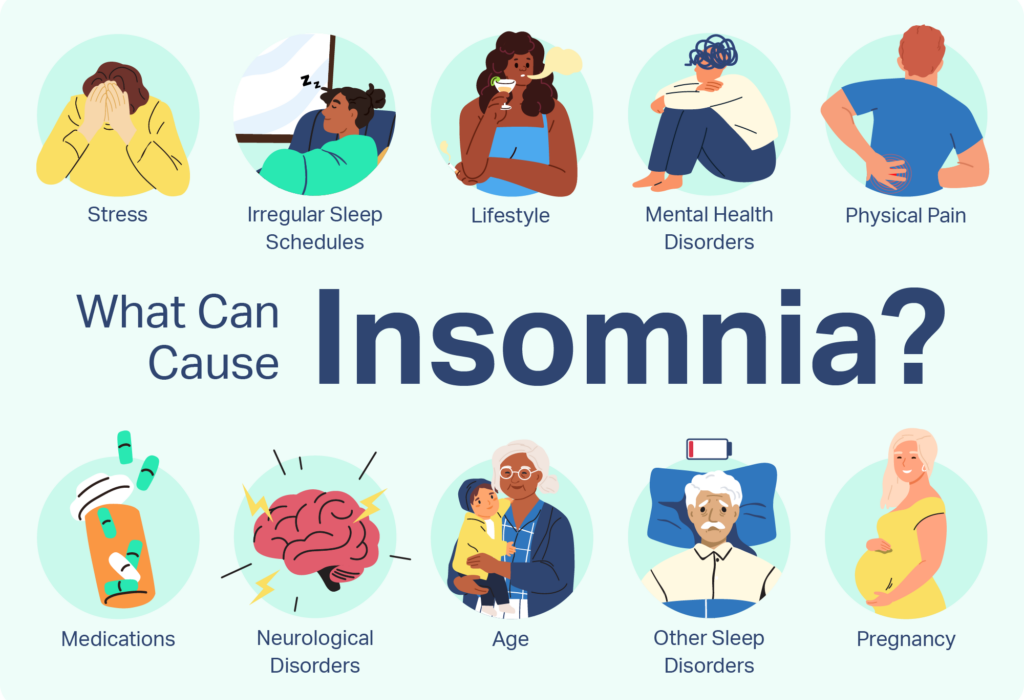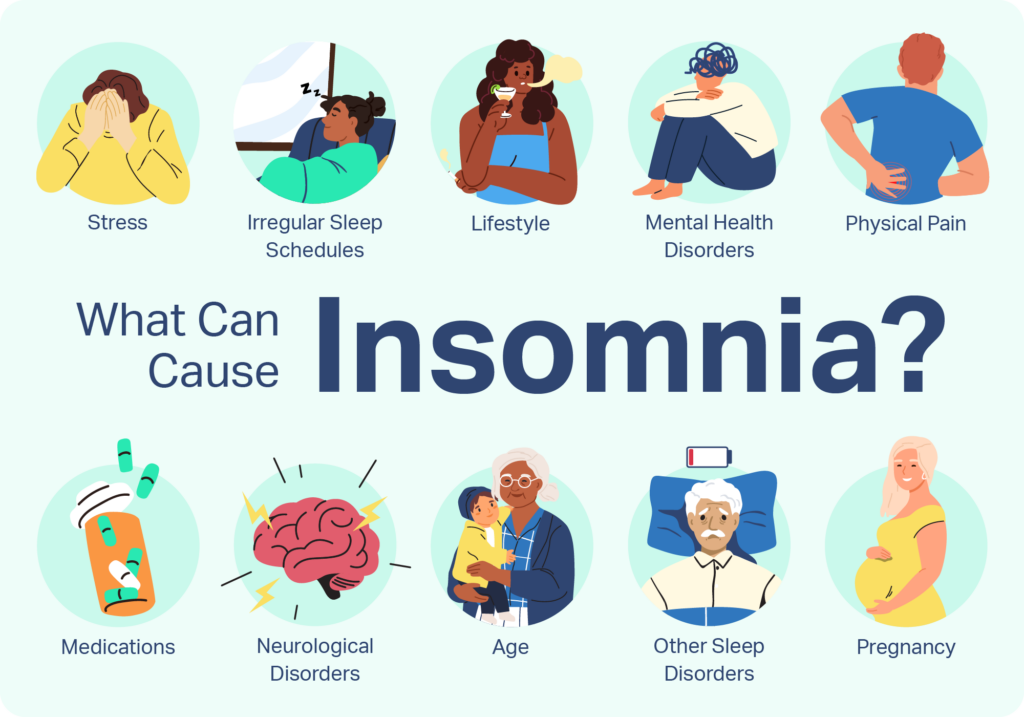Feeling stressed or anxious? Can’t seem to catch a good night’s sleep? Well, you’re not alone. Insomnia, the inability to fall asleep or stay asleep, is a common issue that affects many people. But have you ever wondered what role stress and anxiety play in this sleep-depriving condition? In this article, we’ll dive deep into the connection between stress, anxiety, and insomnia, uncovering the ways in which they intertwine and impact your sleep quality.
When it comes to insomnia, stress and anxiety often take center stage. These two notorious culprits can wreak havoc on your ability to get a good night’s sleep. The modern world is filled with stressors, from work deadlines and financial pressures to personal relationships and global events. All of these factors can trigger stress and anxiety, which, in turn, disrupt your sleep patterns. The mind becomes a battleground, as racing thoughts and worries invade your peace of mind, making it nearly impossible to settle into a restful slumber. So, what’s the deal with stress and anxiety and how do they contribute to insomnia? Let’s find out.
Understanding the Role of Stress and Anxiety in Insomnia
Insomnia is a common sleep disorder that affects millions of people worldwide. It is characterized by difficulty falling asleep, staying asleep, or both. While there can be various causes of insomnia, stress and anxiety often play a significant role in its development and exacerbation. In this article, we will explore the relationship between stress, anxiety, and insomnia, and how managing these factors can lead to better sleep and overall well-being.
The Impact of Stress on Insomnia
Stress is a natural response to challenging situations, and in small doses, it can even be beneficial. However, chronic or excessive stress can have a detrimental impact on our sleep patterns. When we experience stress, our bodies release cortisol, a hormone that helps us stay alert and focused. However, prolonged exposure to high levels of cortisol can disrupt our sleep-wake cycle, making it difficult to fall asleep and stay asleep throughout the night.
Additionally, stress can lead to racing thoughts and an overactive mind, making it hard to relax and unwind before bed. Worries and concerns about work, relationships, or other aspects of life can keep our minds active and prevent us from entering a restful state. This mental hyperarousal can contribute to insomnia and create a vicious cycle where lack of sleep leads to increased stress, which in turn further disrupts sleep.
Strategies for Managing Stress-Related Insomnia
If stress is contributing to your insomnia, there are several strategies you can employ to help manage and reduce stress levels. One effective approach is to incorporate stress-reduction techniques into your daily routine. This can include activities such as meditation, deep breathing exercises, or engaging in hobbies that promote relaxation and mindfulness. Taking time for self-care and prioritizing activities that bring you joy and peace can help alleviate stress and improve sleep quality.
Another important aspect of managing stress-related insomnia is establishing a consistent bedtime routine. Engaging in relaxing activities before bed, such as reading a book, taking a warm bath, or listening to calming music, can signal to your body that it’s time to wind down and prepare for sleep. Creating a soothing environment in your bedroom, free from distractions and electronic devices, can also contribute to a more restful sleep.
It’s important to note that if stress becomes overwhelming and starts to significantly impact your daily life, seeking professional help from a therapist or counselor may be beneficial. They can provide guidance and support in developing healthy coping mechanisms and stress management strategies tailored to your specific needs.
The Link Between Anxiety and Insomnia
Anxiety is a common mental health condition characterized by excessive worry, fear, and nervousness. It can manifest in various ways, including generalized anxiety disorder, panic disorder, or social anxiety disorder. Anxiety and insomnia often go hand in hand, with each condition exacerbating the other.
Anxiety can cause a range of physical and psychological symptoms, such as racing thoughts, restlessness, and muscle tension. These symptoms can make it challenging to relax and fall asleep at night. Additionally, individuals with anxiety may experience intrusive thoughts or worries that keep them awake, further contributing to insomnia.
Strategies for Managing Anxiety-Related Insomnia
If anxiety is contributing to your insomnia, incorporating anxiety management techniques into your daily routine can be helpful. Regular exercise has been shown to reduce anxiety and improve sleep quality. Engaging in activities such as yoga, tai chi, or aerobic exercises can help release tension, promote relaxation, and regulate the body’s stress response.
Practicing good sleep hygiene is also crucial for managing anxiety-related insomnia. This involves establishing a consistent sleep schedule, creating a comfortable sleep environment, and avoiding stimulants such as caffeine or electronic screens before bed. Implementing relaxation techniques, such as progressive muscle relaxation or guided imagery, can also be beneficial in calming the mind and preparing for sleep.
If your anxiety symptoms persist or significantly interfere with your daily functioning, it is essential to seek professional help. A mental health professional can provide a comprehensive assessment and develop a personalized treatment plan that may include therapy, medication, or a combination of both.
The Role of Cognitive Behavioral Therapy for Insomnia (CBT-I)
In addition to managing stress and anxiety, cognitive-behavioral therapy for insomnia (CBT-I) has been shown to be highly effective in treating insomnia. CBT-I is a structured, evidence-based therapy that addresses the underlying thoughts, behaviors, and emotions associated with sleep difficulties.
CBT-I aims to identify and challenge negative sleep-related beliefs and thoughts, develop relaxation techniques, and establish healthy sleep habits. It also focuses on improving sleep hygiene and implementing strategies to manage stress and anxiety. Research has consistently demonstrated the effectiveness of CBT-I in improving sleep quality and reducing insomnia symptoms.
CBT-I can be conducted in individual or group therapy sessions, and it typically involves several components, such as sleep restriction, stimulus control, and cognitive restructuring. By targeting the root causes of insomnia, CBT-I provides individuals with long-lasting tools and strategies to overcome sleep difficulties and improve overall sleep quality.
Conclusion
In summary, stress and anxiety can significantly impact our ability to sleep well. The release of stress hormones and the presence of racing thoughts can disrupt our sleep-wake cycle and make it difficult to fall asleep and stay asleep. By managing stress and anxiety through various techniques such as stress reduction, anxiety management, and cognitive-behavioral therapy for insomnia, individuals can improve their sleep quality and overall well-being. Remember, if persistent sleep difficulties or mental health concerns arise, it is important to seek professional help for a comprehensive assessment and tailored treatment plan.
Key Takeaways: What role does stress and anxiety play in insomnia?
- Stress and anxiety can make it difficult to fall asleep at night.
- They can also cause frequent awakenings during the night.
- Stress and anxiety can lead to a racing mind, making it hard to relax and unwind.
- Insomnia is often a result of the vicious cycle between stress, anxiety, and sleeplessness.
- Addressing stress and anxiety through relaxation techniques and therapy can help improve sleep quality.
Frequently Asked Questions:
1. What impact does stress have on insomnia?
Stress is a major contributor to insomnia. When we are stressed, our body releases stress hormones like cortisol, which can interfere with our sleep patterns. This can make it difficult to fall asleep or stay asleep throughout the night. Additionally, stress can also lead to racing thoughts and worry, making it hard to quiet the mind and relax before bed.
Furthermore, stress can create a vicious cycle with insomnia. When we don’t get enough sleep, our stress levels can increase, which in turn disrupts our sleep even further. It’s important to address and manage stress in order to improve sleep quality and break this cycle.
2. How does anxiety impact insomnia?
Anxiety and insomnia often go hand in hand. Anxiety can cause heightened arousal and an overactive mind, making it challenging to wind down and fall asleep. Worries, fears, and racing thoughts can keep us awake at night, preventing us from getting the rest we need.
Furthermore, anxiety can lead to physical symptoms such as rapid heartbeat, shallow breathing, and muscle tension, which can make it even harder to relax and drift off into sleep. It’s crucial to address and manage anxiety in order to improve sleep quality and alleviate insomnia symptoms.
3. Can stress or anxiety-induced insomnia be treated?
Yes, stress or anxiety-induced insomnia can be effectively treated. One of the first steps is to identify and address the underlying causes of stress and anxiety. This may involve seeking therapy or counseling to learn coping mechanisms and stress management techniques.
Additionally, incorporating relaxation practices into your daily routine can help reduce stress and anxiety levels, making it easier to fall asleep. Techniques such as deep breathing exercises, meditation, and progressive muscle relaxation can be beneficial in calming the mind and body before bed.
4. Are there any lifestyle changes that can help reduce stress and anxiety-induced insomnia?
Yes, certain lifestyle changes can help reduce stress and anxiety-induced insomnia. Prioritizing self-care and engaging in activities that promote relaxation, such as reading, taking baths, or practicing yoga, can help alleviate stress and anxiety.
Establishing a consistent sleep schedule and creating a relaxing bedtime routine can also signal to your body that it’s time to wind down and prepare for sleep. Avoiding stimulants like caffeine and electronic devices close to bedtime can also contribute to better sleep quality.
5. When should I seek professional help for stress and anxiety-induced insomnia?
If stress and anxiety-induced insomnia persist and significantly impact your daily life, it may be beneficial to seek professional help. A healthcare professional or sleep specialist can provide a thorough evaluation and help develop a tailored treatment plan.
They may recommend cognitive-behavioral therapy (CBT) for insomnia, which focuses on changing negative thought patterns and behaviors related to sleep. In some cases, medication may be prescribed to address underlying anxiety or sleep disturbances. It’s important to reach out for support if insomnia continues to affect your well-being and quality of life.
Final Summary: The Impact of Stress and Anxiety on Insomnia
When it comes to understanding the role of stress and anxiety in causing insomnia, it’s clear that these factors play a significant role in disrupting sleep patterns. Insomnia, a common sleep disorder that affects millions of people worldwide, can be exacerbated by the presence of stress and anxiety. This conclusion is supported by numerous studies and research conducted on the subject.
One of the key findings is that stress and anxiety can lead to hyperarousal, making it difficult for individuals to relax and fall asleep. The racing thoughts, heightened alertness, and physical tension associated with stress and anxiety can keep the mind and body in a state of alertness, making it challenging to achieve a restful night’s sleep. Furthermore, the negative emotions associated with stress and anxiety can create a vicious cycle, as the lack of sleep caused by insomnia can in turn increase stress levels and perpetuate the problem.
It is crucial to address stress and anxiety as part of any treatment plan for insomnia. By implementing stress management techniques, such as mindfulness, deep breathing exercises, and relaxation techniques, individuals can reduce the impact of stress and anxiety on their sleep. Additionally, seeking professional help from therapists or counselors can provide valuable support in managing stress and anxiety, ultimately improving sleep quality.
In conclusion, stress and anxiety have a significant impact on insomnia, making it crucial to address these factors in order to promote better sleep. By understanding the connection between stress, anxiety, and insomnia, individuals can take proactive steps to manage their mental well-being and improve their sleep hygiene. Remember, a good night’s sleep is essential for overall health and well-being, so don’t underestimate the power of managing stress and anxiety in your quest for restful slumber.




